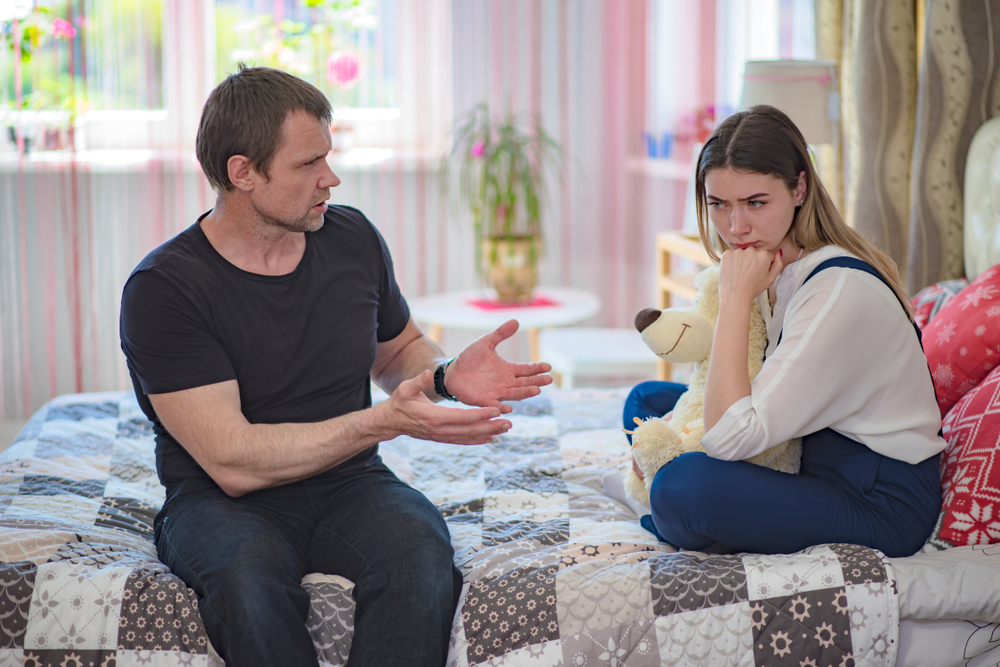Children learn about the world through words, especially the ones spoken at home. When those words come from emotionally manipulative parents, they often carry hidden messages that shape a child’s sense of self, worth, and boundaries. Manipulative parents tend to use language that shifts blame, guilt, or emotional responsibility onto their child. Over time, these phrases can confuse, control, or distort a child’s emotional development.
Below are eight common phrases emotionally manipulative parents say, along with the impact they may have had on you growing up. If these sound familiar, it may be a sign you were raised in a household that used emotional control rather than healthy connection.
“After everything I’ve done for you”

This phrase often comes up when a child sets a boundary or disagrees with a parent’s decision. Rather than respecting the child’s point of view, the parent redirects the focus to their own sacrifices. It sends the message that love must be repaid, making the child feel indebted for receiving basic care.
The problem here is that parenting is a responsibility, not a transaction. Children should not feel guilty for having needs, making mistakes, or seeking independence. When parents use this phrase, it teaches children to suppress their own feelings to avoid being seen as ungrateful.
“You’re too sensitive”

Dismissive statements like this teach children to distrust their emotions. When a parent says this after hurting a child’s feelings, it sends the message that the child is wrong for feeling hurt. Rather than validating the child’s experience, the parent shifts blame onto the child’s emotional response.
Over time, this can create self-doubt. Children begin to wonder whether their feelings are valid or acceptable. Adults raised with this phrase often struggle to identify or express their emotions clearly, fearing they will be judged or invalidated.
“Why can’t you be more like your sibling?”

Comparisons are a classic tool of manipulation. This phrase pits children against each other and creates competition for parental approval. Instead of recognizing a child’s individual strengths, it promotes shame and a sense of inadequacy.
Emotional manipulation thrives in environments where a child feels they must earn love. Constant comparisons teach children to see themselves as not good enough and to link their value to performance rather than personhood. It can also damage sibling relationships by fostering jealousy and resentment.
“You’re the reason I’m unhappy”

Blaming a child for adult problems is one of the most damaging patterns in manipulative parenting. This phrase burdens a child with emotional responsibility for their parent’s well-being. It suggests that the child’s existence, behavior, or needs are the source of the parent’s distress.
Children cannot control adult emotions, yet phrases like this make them feel they must. They grow up overly attuned to others’ moods and often become people-pleasers. They may also carry intense guilt, believing they are inherently harmful to others.
“Don’t tell anyone what happens in this house”

This phrase creates secrecy and isolates children from outside support. It can be used to cover up neglect, verbal abuse, or even emotional manipulation itself. It communicates that loyalty to the family is more important than personal safety or truth.
When children are told not to speak about their home life, they often develop shame and confusion about what is normal. They may struggle to form honest relationships or to seek help when something feels wrong. This kind of control often carries into adulthood, making it difficult to trust others.
“If you really loved me, you would…”

Emotional manipulation often involves guilt-based tactics. This phrase is designed to coerce behavior by framing love as conditional. It tells the child that their value and acceptance depend on meeting the parent’s expectations.
This erodes a child’s sense of autonomy and boundaries. Love becomes a performance instead of a secure bond. Adults who heard this phrase growing up often feel pressured to prove their love in relationships, even at the cost of their own comfort or safety.
“I gave you life, so you owe me”

This phrase turns the role of parenting into a lifelong debt. It implies that a child must always obey or satisfy the parent’s wishes, no matter how unreasonable, simply because they were born.
Manipulative parents who use this line often expect adult children to sacrifice their dreams, time, or freedom in service to the family. It keeps the child locked in guilt-based loyalty rather than encouraging independent growth. The healthy alternative is a parent who gives without expecting repayment.
“That never happened, you’re imagining things”

This is a form of gaslighting. It denies the child’s reality and replaces it with the parent’s version of events. Over time, this confuses memory, weakens confidence, and makes children question their own perception of the world.
Being constantly told that your experience is false leads to a deep sense of self-doubt. Adults who were gaslighted as children often feel unsure of their decisions, second-guess their instincts, and struggle with self-trust in all areas of life. Emotional manipulative parents use this phrase to rewrite reality and maintain control.
The Long-Term Effects of Manipulative Language

The impact of hearing these phrases during childhood can be profound and long-lasting. Emotionally manipulative language shapes how children see themselves, how they relate to others, and how they understand boundaries and emotions. It often leads to low self-esteem, chronic guilt, and difficulty trusting or expressing emotions.
Adults raised with manipulative parents may find themselves in toxic relationships, people-pleasing roles, or cycles of emotional burnout. Recognizing these phrases is often the first step to healing. Awareness opens the door to setting healthy boundaries, building emotional intelligence, and reclaiming your voice.
How to Begin Healing

If you recognize any of these phrases from your childhood, know that you are not alone. Many adults are just beginning to uncover the effects of emotionally manipulative parenting. Healing starts with naming what happened. Learning to identify unhealthy patterns can help you replace them with respectful, clear communication.
Therapy, journaling, and support groups can all be helpful tools. You may also benefit from learning assertive communication skills and practicing emotional regulation. Rebuilding your inner voice, the one that knows your worth and sees your truth, is key to breaking free from childhood conditioning.
Read More: 8 Subtle Signs of Toxic Communication and How to Handle Them
Final Thoughts

Emotionally manipulative parents often use subtle language that leaves lasting emotional wounds. While phrases like “you’re too sensitive” or “if you really loved me” may sound harmless on the surface, they can do real damage to a child’s developing identity. Recognizing these signs can help you understand your upbringing with clarity and compassion. It also empowers you to stop the cycle and create healthier relationships going forward.
If any of these phrases sound familiar, you may have been raised in an environment that prioritized control over connection. But with awareness, you can rewrite your story, reclaim your voice, and build emotional health based on truth, not guilt.
Read More: 10 Phrases Selfish People Use to Control You
Disclaimer: This article was created with AI assistance and edited by a human for accuracy and clarity.

